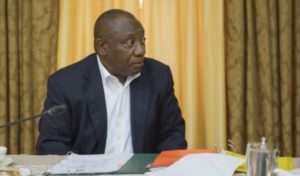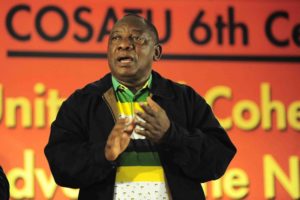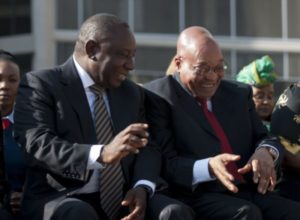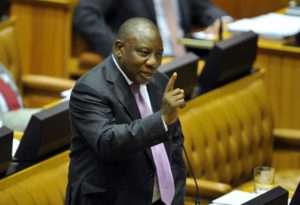If you’re wondering what he stands for and the policies he represents, we’ve got your answers…
By Tom Head – 2017-12-18

PRETORIA, SOUTH AFRICA – AUGUST 01, 2017: Deputy president Cyril Ramaphosa at the Presidential Guest House on August 01, 2017 in Pretoria, South Africa. The Cabinet Lekgotla will be held for the next 3 days to stimulate economic growth and improve the governance systems.
Image Credits: Gallo Images / Beeld / Lisa Hnatowicz
Cyril Ramaphosa has officially become the President of the ANC, ousting Nkosazana Dlamini-Zuma in a hotly-contested vote at the ANC Elective Conference 2017.
After an exhausting campaign that started at the beginning of 2017, its Ramaphosa’s message of change and economic regeneration that has swayed the ANC delegates.
We thought it’d be quite useful to have a look at what Cyril stands for. Will he toe the party’s divisive line, or can Mr Ramaphosa lead the ANC away from darkness?
By 2019, you could very well be off to the polls and considering a vote for this man. So here’s everything you need to know about ANC President, Cyril Ramaphosa:
What will voters get from Cyril Ramaphosa?
History and background
He was born in Soweto and grew up in the south western Township. He went on to complete his law degree at the University of Limpopo, where he first dipped his toes into political waters by joining the SA Students Organisation.
In 1991, he became the ANC’s Secretary General and played a key role in negotiating the end of apartheid with the National Party. He held office for six years, and challenged Thabo Mbeki for the presidency nomination in 1997.
When Mbeki won, Ramaphosa took a 10-year hiatus from politics before being re-elected to the ANC NEC back in 2007. He successfully beat Tokyo Sexwale and Mathews Phosa to the Deputy Presidency in 2012, and now Cyril is going after the biggest job there is.
What has he fought for?
After a lifetime of taking on apartheid, Ramaphosa was instrumental in delivering democratic elections to SA in 1994.
Ramaphosa fought hard for racial equality. Not only was he a member of the Black People’s Convention, but he spent 11 months in solitary confinement for organising Mozambique liberation rallies in 1974.
He is a staunch trade unionist. He founded the NUM and helped to establish Cosatu.
Formed the Adopt-a-school foundation. The 146 schools in the programmes receive funding and investment from registered donors.


PRETORIA, SOUTH AFRICA MAY 30: Deputy President Cyril Ramaphosa addresses the audience during the Cosatus central committee meeting on May 30, 2017 in Pretoria, South Africa. During his address, Ramaphosa said state capture is the elephant in the room and it is busy eating away the ANC. (Photo by Gallo Images / Sowetan / Thulani Mbele)
Deputy President Cyril Ramaphosa addresses the audience during the Cosatu central committee meeting (Photo by Gallo Images / Sowetan / Thulani Mbele)
What are Cyril Ramaphosa’s political policies?
As we’ve mentioned, Cyril Ramaphosa has forged his beliefs from years of trying improve the rights of workers. He wants further progress and implementation of a national minimum wage, and wants to improve labour stability standards.
He is a supporter of Radical Economic Transformation, and a keen advocate of finding more work for women by ‘diversifying’ SA’s economy. In fact, Ramaphosa has put job creation at the top of his presidential priorities.
In the last year, he has become a vocal critic of state capture architects, the Guptas and Jacob Zuma. A Ramaphosa presidency could potentially limit their influence and hold Zuma accountable for his dealings.
However, given that he’s been JZ’s right hand man for the last few years, some feel that he only cranked up the rhetoric to land more votes. From this day forward, his actions must speak louder than his words.
 

PRETORIA, SOUTH AFRICA – AUGUST 09: President Jacob Zuma and his deputy, Cyril Ramaphosa during the national Women’s Day celebrations (Photo by Gallo Images / Thapelo Maphakela)
Style of Politics
Ramaphosa says he is a socialist, but has avoided becoming a member of the SA Communist party. Through years of working in business and leading re-unification talks, Ramaphosa is definitely a strong negotiator. He’s shown once before he can do the best thing for the people, but 23 years is a long time in politics.
Who backs him?
Predictably, he has the support of the trade unions. Other big name supporters include ANC Treasurer-General Zweli Mkhize and ex-Finance Minister Pravin Gordhan. He secured five out of nine provincial votes, to Dlamini Zuma’s four.*
*It’s technically only three. See David Mabuza and ‘unity’
However, his most integral supporter – and member of his top six – could be Senzo Mchunu.
The ex-KZN premier could hold a certain sway in the state, as it is the biggest province for registered ANC members. Mchunu would be able to give Ramaphosa a foothold in a province that backed the other Presidential candidate, Nkosazana Dlamini-Zuma.
What could voters hold against Cyril?
Cyril Ramaphosa has certainly not lived without controversy. Despite his charitable activities, some find it hard to believe his socialist stance when his personal wealth is estimated at $675m.
Earlier in 2017, Cyril has had to admit to cheating on his wife, following numerous allegations about his personal life. Although, the politically-motivated leaks didn’t derail his campaign as intended.
Mr Ramaphosa’s darkest hour came whilst he was an executive and shareholder for mining company, Lonmin. When workers went on strike, police opened fire on the protesters, killing 34 in the ‘Marikana Massacre’.
The company consulted Ramaphosa as the protesting miners made their voices heard. He gave them the go-ahead to increase the police presence which lead to authorities turning on the people. Some South Africans hold him personally responsible for the tragedy.
Could Ramaphosa be a good president?
He is extremely experienced, and has accumulated an excellent wealth of business knowledge through his professional career. In comparison to Nkosazana Dlamini-Zuma, it seems Ramaphosa would be a welcome new direction for the ANC.
 

Ramaphosa has been part of the ANC for almost 30 years (Gallo Images / Die Burger / Lulama Zenzile)
He’s a fine negotiator, and has the gift of the gab. Certainly, he’s enough of a Zuma-critic to appease disgruntled ANC members. He may well be the ‘unity’ candidate the party are in desperate need of.
There are skeletons in his closet, though. His horrendous Marikana misjudgement (indirectly) caused a lot of deaths. His previously-respected crisis management skills will always be questioned, under the cloud of his fateful decision.
What can South Africa expect from Cyril Ramaphosa as ANC President?

